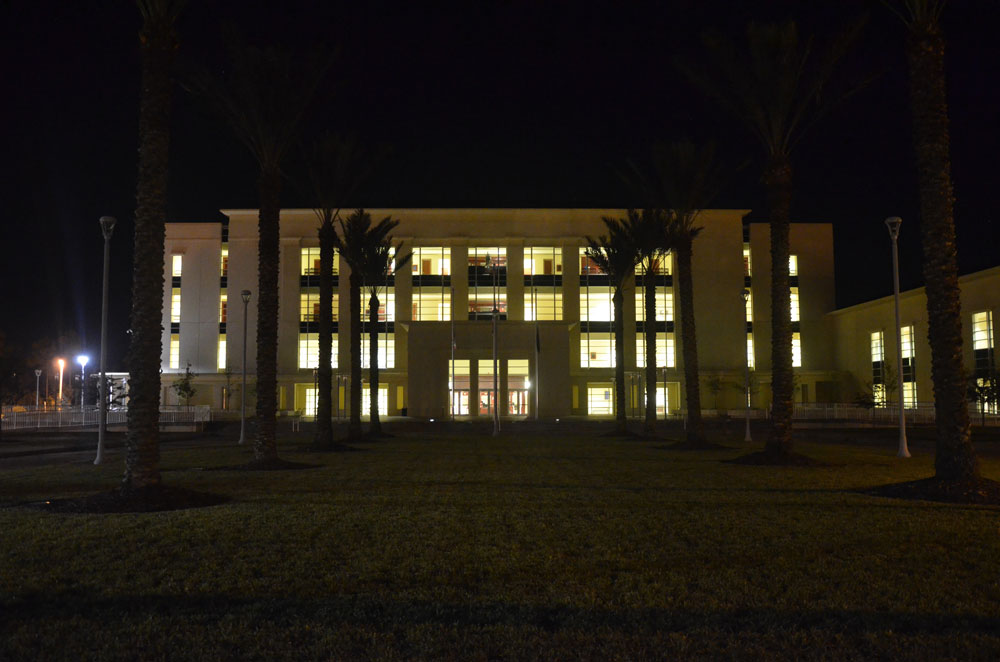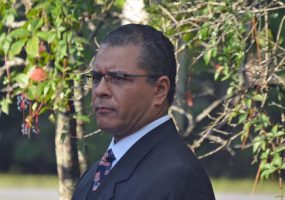
Florida’s Covid-19 cases have doubled in less than 48 hours, to 319, spreading to 30 out of the state’s 67 counties, including at least nine cases in Volusia and four in St. Johns. Flagler County still has not registered a case affecting a Flagler County resident, though the Department of Health’s county-by-county cases still do not reflect cases affecting non-county residents, even though the individuals may be located in the county. And local officials say residents must behave as if the virus is all around them.
“Every single Flagler County resident, business, employee and responder, we have to operate as if it is here,” Flagler Emergency Management Chief Jonathan Lord said today. “Nobody is immune to this, some people’s immune systems will handle it better, others will end up in the hospital and some will, unfortunately pass away.”
The reality, more stark elsewhere but with diminishing distance from Flagler, is intensifying local measures to stave off the worst while maintaining at least a measure of limited freedoms. But any sense of normalcy has been diminishing rapidly, with schools not projected to reopen until at least mid-April, if not later. Nationally, public officials are warning of an emergency lasting months, not weeks.
Florida’s and Flagler’s judiciary are now reflecting both the urgency and critically unique nature of the emergency, with sobering hints of things to come.
Last Friday the Florida Supreme Court ordered certain courthouse functions scaled back. In the Seventh Judicial Circuit for example, which covers Flagler, Volusia, St. Johns and Putnam, all criminal proceedings were pushed back two weeks. But most other functions carried on. That changed on Tuesday, with the new order scrapping all but “mission critical” proceedings from docket and court functions starting at 5 p.m. today, and lasting at least through April 6.
The court system’s new restrictions reveal the potential for extraordinary, court-ordered measures in answer to the coronavirus emergency, pointing to the sort of unprecedented role the courts and law enforcement may be taking on in the weeks and months ahead.
“This whole event is unprecedented,” Lord said.

Raul Zambrano, chief judge of the Seventh Judicial Circuit, outlined proceedings that will continue. Those involve requests for “do not resuscitate” orders, violations of orders to limit travel, violations and enforcement of curfews, violations of no-travel or quarantine and isolation orders, “mandatory vaccination proceedings,” the seizure of bodily fluids, extraordinary writs, and “any other ’emergency’ proceedings or hearings as authorized by the Chief Judge.”The powers have always been outlined in Florida law, albeit in a dormant state until now, and none of those orders or proceedings have been executed so far. But the fact that the courts are specifying those powers among the list of proceedings they would carry out if necessary is an indication of the severity of enforcement the justice system and law enforcement are prepared to pursue during the public health emergency.
The order can in certain instances be vague enough that latitude given judges may itself be extraordinary, with the timeline for interpreting those judgments forcibly altered by the circumstances and urgency surrounding potential cases. And it is not clear as yet where such proceedings would take place” “These proceedings in Flagler, Putnam and St. Johns Counties will be considered/heard at locations designated by the Administrative Judge of each county, or the Department of Health,” Zambrano’s order reads. The administrative judge is Terence Perkins. The vagueness of that part of the order raises the possibility that such proceedings may take place with little notice, or out of pubic view.
The “mission critical” proceedings also include, of course, numerous more routine proceedings that do go on. Those proceedings include first appearances (which are typically conducted by video feed from the jail, with a judge sitting in the courtroom and few other people present; now all of those proceedings have been ordered to be conducted electronically), bond hearings, juvenile detention hearings, various types of injunctions, Baker Acts and certain family law cases “where the imminent safety of children is at issue.” Requests for search and arrest warrants, of course will continue to be granted, though those can take place at a judge’s doorstep.
But no inmate is to be taken to any courtroom anymore for the duration of the order without a written order by the administrative judge in each county.
In Flagler, Baker Acts will take place in person “at a time and location designated by” Circuit Judge Terence Perkins, the order states. And probation officers may, without permission from the court, alter the drug testing schedule of individuals in their case load.
Gov. Ron DeSantis on Tuesday recommended the elimination of all gatherings of 10 people or more, ordered non-restaurant bars and pubs to close, and restaurants to cut their capacities by half, but stopped short of ordering the closure of beaches even as spring break has drawn throngs of beach-goers on the east and west coasts of the state. At least eight cities have ordered their beaches closed as of Wednesday morning: Boca Raton, Deerfield Beach, Lauderdale-by-the-Sea and Pompano Beach, Dania Beach, Fort Lauderdale, Hallandale Beach, Hollywood and Miami Beach. As beaches close, local officials fear that waves of spring breakers and others wash over the next-closest beach that remains open.
Flagler Emergency Management Chief Jonathan Lord has been in discussions with Flagler Beach officials, passing on the guidance from the state regarding bachgoing: people must maintain distances of six feet from each other and not gather in groups of more than 10. Lord said Flagler County doesn’t get the sort of crowds that collect on beaches in South Florida, nor would the county have the capacity to accommodate such crowds in local hotels.
“We don’t even have the parking that would allow that kind of mass,” Lord said. “What we here would call a crowded beach is nothing like what Miami would call a crowded beach.”
That makes the crowds less of an issue locally, though Flagler Beach City Commissioner Eric Cooley has been concerned about the crowds he sees gathering not just outside his 7-Eleven store on the beach, but those that have been pouring in all day, every day, with little heed to the virus. “We have allowed ourselves to become so spoiled that we aren’t even willing to make temporary changes to some behaviors to protect others or ourselves,” he wrote on his Facebook page. He’s called it a “disaster unfolding before our eyes,” and said in an interview Tuesday that he would be discussing the issue at the special meeting of the Flagler Beach City Commission Thursday.
Lord said it’s all a continuing balancing act. “I think about this all the time when I am making decisions and or recommendations,” he said. “There is an impact to everything we do,” such as the governor’s order to close bars. “I strongly believe, and I don’t want this to be true, but a subset of those bars when we go back to normalcy in a month or two, aren’t ever going to open again.”
Lord has also been thinking about this: The coronavirus is the first emergency that may upend the way the emergency management system works. That system rests on the premise that when one locality is going through an emergency, it can always rely on the support of other communities, other emergency management infrastructures. That’s what happened when, say, emergency management teams from other parts of the state came to Flagler to assist during the Hurricane Matthew and Irma emergencies. But with the coronavirus affecting the entire nation, communities are essentially on their own.
“This is the one–and I was very blunt with our partners the other day–this is the one where unfortunately we can’t put in the request and expect help from other places, because everyone else is dealing with the same thing. This is where the community works together,” Lord said. “This is going to be the kind of event where you’ll see us at the county level putting out that kind of call,” with a request for volunteers, should the need arise. “Please help us, help us help each other.”
On the other hand, Lord said, he chose Flagler County as his place to live and work because he saw in the county a distinctively more engaged citizenry.
“I think we have a higher per capita participation of active volunteers,” Lord said, a distinction he finds reassuring. “It’s one of the things that drew me strongly to this community.”
![]()





























Just a thought says
I have a question about some constitutional rights, such as right to assemble, right to speedy trial, etc. I understand no one has not stopped the right to assemble, just advised against it. But by clearing dockets at the courthouse may violate the right to a speedy trial. What is the opinion of the seventh district court? I’m just curious.
Anonymous says
The Hammock Beach Resort is currently packed. It may not be comparable to the crowd you would see in Miami but there is still 150 plus people sitting around the pool daily. THIS IS A HUGE PROBLEM AND SOME NEEDS TO STOP!!!